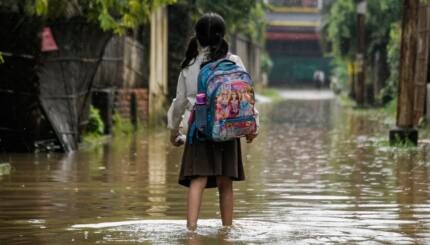A few years ago, my then-boss–a yarmulked über-Jew named Yossi Abramowitz–asked if I planned to send my kids to day school. I don’t remember my response, but I can tell you what I thought: “Dude, are you kidding?” I was a secular public-school kid, my wife was a secular public-school kid, and my children, when they were old enough, would follow pedagogical suit. We didn’t pay those insanely super-high Newton, Mass., taxes for nothing.
Well, it’s the Winter of 2009, and my six-year-old little daughter Shoshi is in her second year at Solomon Schechter Day School of Greater Boston.
How in the name of Cynthia Ozick did this happen?
Friends of ours were looking at Schechter for their child, and Lisa was intrigued. After some husband-and-wife back-and-forth, I agreed to go with her and meet the friendly people at the school (it’s the kind of place where every morning the kids are greeted with a cheery “Boker tov!“). In the end, we decided to give Shecky–I sometimes call the school “Shecky” or “Solly,” because these terms are, to my ears, more heimish than “Schechter”–a shot. Plus it’s the kind of place that would make anti-Semites crazy if they saw it. I love that.
With your help, My Jewish Learning can provide endless opportunities for learning, connection and discovery.
And you know what? Jewish kindergarten was cute. The songs were cute. The holiday celebrations were cute. The Israeli dancing, the never-ending stream of Jewish-themed art projects, even Shlomo the Bunny, a hand puppet who dramatized the kids’ day-to-day troubles: all of this was cute as a bright Jewish button.
Then came our year-end parent-teacher conference.
Shoshi’s teacher, Susan, told us that, starting in first grade, half the school day would be in Hebrew. Half the day! This wasn’t a total surprise–I knew that later on the kids did bilingual days, but I hadn’t, until that meeting, realized it started in first grade. My little girl would be living in a language I don’t really know (more on this later), and it now seemed not just a second language, but a religious one. As literary critic George Steiner recently wrote, “Hebrew is a calling by, a summons from, an address to God,” which, in this context, freaked me out a bit.
Another freak-out moment came via Solly’s website. “Each week the parashah (Torah portion) is discussed in English, focusing on major themes and making them relevant to first graders,” it reported. “Students are exposed to one verse from each parashah in Biblical Hebrew, and take-home family activities connected to one idea from each parashah.”
To which I could only say, “No hablo ‘parashah.'”
My childhood home was a more-or-less Torah-free zone. Yes, my brother and I were bar mitzvahed via the tape-recorder-and-transliteration method, and we each received a volume of Pentateuch from our pals in the temple brotherhood, but we never investigated a single one of the Five Books of Moses. I look at the enthusiasm and care with which Shoshi is taught, and am annoyed at what a lousy Jewish education I had. I can recognize the Hebrew letters, and know by heart the melodies of the most popular Hebrew prayers–nothing else. Really, it’s absurd. I remember my old Hebrew School teacher, an unfortunately dandruffed fellow named Mr. Flum, and wonder, “What in the world were you thinking?” (On the other hand, I’m sure Mr. Flum was severely underpaid and had to work with a bunch of less-than-committed, mostly annoying kids. He was probably thinking, “What in the world am I doing here?”)
Much of my Jewish education has been picked up in my 30s, on the fly, as the editor of JBooks.com, the website about Jewish books. This contrasts strongly with Shosh, who recently mentioned something about Yom Hashoah, Holocaust Remembrance Day, a holiday I hadn’t heard of until 2004.
“What do you know about Yom Hashoah?” I asked, surprised that they teach Kindergarten kids about this.
“I don’t want to say because I’ll start crying.”
For kids at Solly, religion is a central part of school life; but this isn’t what’s going down at the ole Gordon bayit. We belong to no temple, though we do hit the odd Tot Shabbat service. When we do Shabbat Dinner, the girl manically runs around, “Shoshi’s Shabbat Bag” in hand, and sets the table, prepares the challah, the candles, the wine, the whole Shabbos schmear. And Israel! Oy, Israel! After our babysitter gave her an “I ♥ Israel” t-shirt, Shoshi was so excited that she started to shake. (It was like a Beatles concert.) When I was a kid, Israel was more or less a faraway place on the map; my dad was a branch manager at the Israeli Discount Bank of New York, and we had some distant Holy Land cousins. I liked knowing that there was a Jewish State, but my homeland was a place called Suburban New Jersey. Exit 8.
While my mostly a-religious childhood lacked a certain gravitas, it also gave me a dose of American freedom: freedom to think and act and eat and dress as I liked (OK, I was free up to the point my parents allowed, which, now that I’m a dad, doesn’t seem so bad at all). But the real issue here is this: What kind of freedom do I want for Shoshi? What happens if Shoshi seeks the kind of religious freedom she can’t get at home? What if she starts seeing life in terms of observance (good) and non-observance (bad)? I’d be profoundly annoyed at myself if she ever said to me, “Daddy, I can’t bring the kids over for dinner because you guys aren’t kosher,” or worse, “Sorry, Abba, but you and Ema can’t stay with us in Jerusalem because your ‘cultural Judaism’ is a bad influence on my little Akiva.”
As Mr. JBooks, I have my own sort of Jewish pride. I believe–can’t seem to escape those religious figures of speech–in a literary sort of Jewish Peoplehood, in which the central rituals are reading and writing and thinking about the many genres of Jewish experience. Conventional ritual is fine for some, but to me, being an “observant” Jewish reader is more meaningful than, say, wearing a kipah. So I am ambivalenti about Schechter when they demand that every boy on campus wear religious headgear.
On the other hand–on the other hand: what the hell am I, a 21st-century Tevye?–a kipah is just a kipah. I love the fact that Shoshi’s growing up Jew-positive. It’s been great experience, actually. Throughout Kindergarten, we slugged our way through various Hebrew-language picture books. At first it was great fun to try and decode the right-to-left volumes but then, one day, she asked, “Daddy, how come you don’t read Hebrew the way you read English?” By which she meant: “Why so slow, Dad? And why don’t you understand everything you read? These books are for toddlers!” I explained that Grandma and Pop didn’t send me to day school and that I really had to teach myself Hebrew. But for her, it’s becoming a natural part of her daily vocabulary.
“Lo la’gaat,” she’ll say to her little brother when he grabs for something he shouldn’t.
“Tov!” she’ll announce when she’s happy.
“Lamah?” she’ll ask, instead of “Why?” when we want her to do something that’s not to her liking.
Her Hebrew is still basic, but it won’t be for long. Shoshi has a friend in her class whose older brother is also Solly kid. The friend says, of Hebrew: “It’s our secret language that our parents don’t understand.”
And there, haverim, is the Jewish-American rub. I fear becoming isolated from my child, the possibility that this education, while obviously good for her, might pull her away from me. Which reminds me of something I read in a memoir about an American kid who leaves law school to become a speechwriter for Ariel Sharon. “In a way I blame my parents,” he writes. “Their decision to enroll me in Jewish day school two decades earlier had set me on a path that would, almost inevitably, lead me either to law school or to the Israel Defense Forces.” Now, do I really think that the road out of day school leads directly to the IDF or Law School? Lo. In fact, I can’t begin to guess where Shoshi will wind up, and it’s probably idiotic to worry about it. When I really use my Jewish head and set aside my fears, I must conclude that the day-school experience will make Shoshi a smarter and better person, and a more knowledgeable Jew. Hard to be ambivalenti about that kind of thing, whether or not you’re wearing a kipah.
Shabbat
Pronounced: shuh-BAHT or shah-BAHT, Origin: Hebrew, the Sabbath, from sundown Friday to sundown Saturday.


